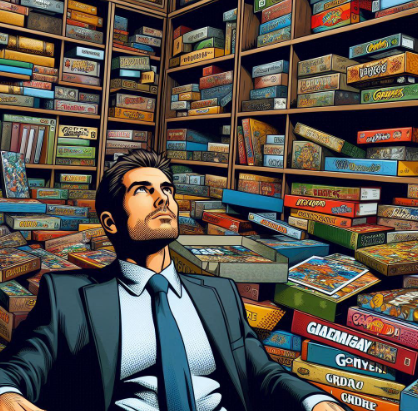Board Game Biz: The Board Games Business Expert You Need...
The board game industry has never been more dynamic. With record numbers of new titles launching each year, a rapidly expanding global audience, and unprecedented demand for high‑quality tabletop experiences, publishers face both extraordinary opportunities and increasing complexity. Navigating manufacturing, sourcing, compliance, logistics, and commercial strategy requires deep expertise — and that’s exactly where BoardGameBiz excels.
BoardGameBiz is a specialist Board Games business expert consultancy dedicated to helping board game creators, publishers, and brands bring their products to market efficiently, reliably, and profitably. With decades of experience in the global toy and game industry, the company provides the insight, connections, and operational support that modern publishers need to succeed.
A Trusted Partner for Board Game Creators and Publishers
BoardGameBiz was founded on a simple principle: great games deserve great execution.
Whether you’re a first‑time creator or an established publisher, the company offers a suite of services designed to remove friction, reduce risk, and accelerate your path to market.
Clients choose BoardGameBiz because they gain access to:
• Deep category expertise
• A global network of trusted manufacturers
• Strategic guidance from industry veterans• Practical support across every stage of development
• Transparent, reliable, commercially grounded advice
This combination of experience and hands‑on support has made BoardGameBiz a trusted partner for companies across Europe, North America, and Asia.
Manufacturing Expertise That Saves Time, Money, and Stress
Manufacturing is one of the most challenging aspects of board game production. Quality, cost, timelines, and compliance all hinge on choosing the right factory — and avoiding the wrong ones.
BoardGameBiz helps publishers:
• Identify the best manufacturing partners for their specific product
• Navigate pricing, materials, and production methods
• Avoid common pitfalls that lead to delays or quality issues
• Ensure compliance with international safety standards
• Manage communication and expectations with factories
With long‑standing relationships across China, India, and other key manufacturing regions, BoardGameBiz provides clients with access to vetted, reliable factories capable of producing everything from simple card games to complex multi‑component tabletop experiences.
End‑to‑End Support for Game Development and Commercial Strategy
BoardGameBiz goes far beyond manufacturing. The company supports publishers across the full lifecycle of a game, including:
• Product development and refinement
• Component optimisation and cost engineering
• Artwork and file preparation guidance
• Packaging strategy• Retail and distribution insights
• Market positioning and commercial planning
This holistic approach ensures that games are not only well‑made, but also commercially viable and strategically positioned for success.
Helping Creators Avoid Costly Mistakes
The board game industry is full of passionate creators, but passion alone doesn’t guarantee a smooth production process. Many first‑time publishers encounter challenges such as:
• Over‑specced components that inflate costs
• Underestimating freight, duties, and logistics
• Miscommunication with factories
• Unrealistic timelines
• Compliance oversights
• Poorly structured quotes or contracts
BoardGameBiz helps creators avoid these issues by providing clear, practical, experience‑driven guidance. The result is a smoother, more predictable journey from prototype to finished product.
A Global Perspective Backed by Real Industry Experience
BoardGameBiz is led by industry veteran Steve Reece, whose career spans more than 25 years in the global toy and game business. His experience includes:
• Working with major global Games companies
• Managing sourcing and manufacturing across multiple regions
• Advising hundreds of startups and established publishers
• Deep knowledge of retail, distribution, and commercial strategy
This background gives BoardGameBiz a unique ability to bridge the gap between creative ambition and commercial reality.
Why Companies Choose BoardGameBiz
BoardGameBiz has become a preferred partner for publishers because it offers:
• Proven expertise in board game manufacturing
• A global network of trusted suppliers
• Practical, commercially grounded advice
• A track record of helping companies scale
• Transparent, relationship‑driven support
• A deep understanding of both creative and operational challenges
Whether you’re launching your first game or managing a growing portfolio, BoardGameBiz provides the clarity and confidence you need to move forward.
Conclusion: The Smartest Way to Bring Better Games to Market
The board game industry is full of opportunity, but success requires more than a great idea. It demands reliable manufacturing, strategic planning, and expert execution. BoardGameBiz delivers all of this — helping creators and publishers bring high‑quality games to market with less risk, less stress, and greater commercial success.
For companies looking to elevate their production, streamline their operations, or expand their global reach, BoardGameBiz is the Board Games business expert consultancy that makes it possible.

